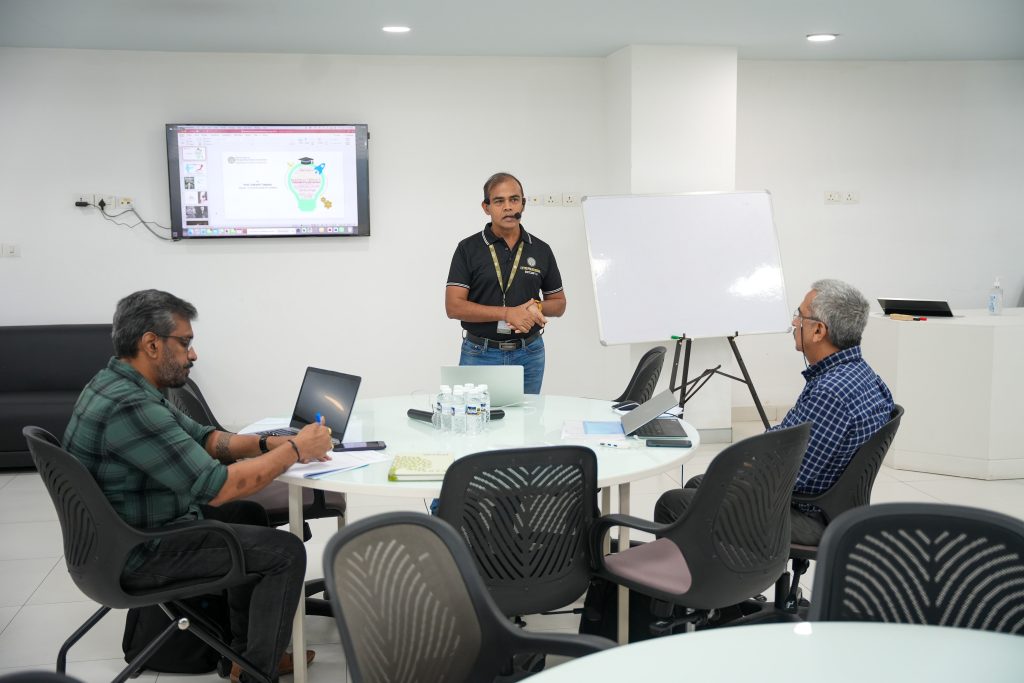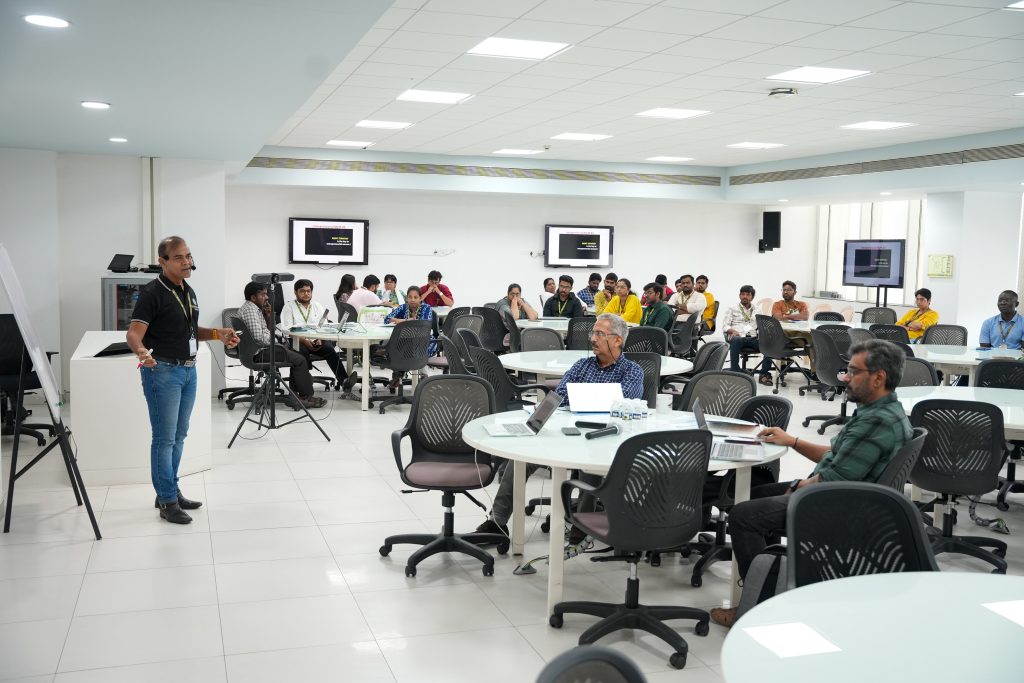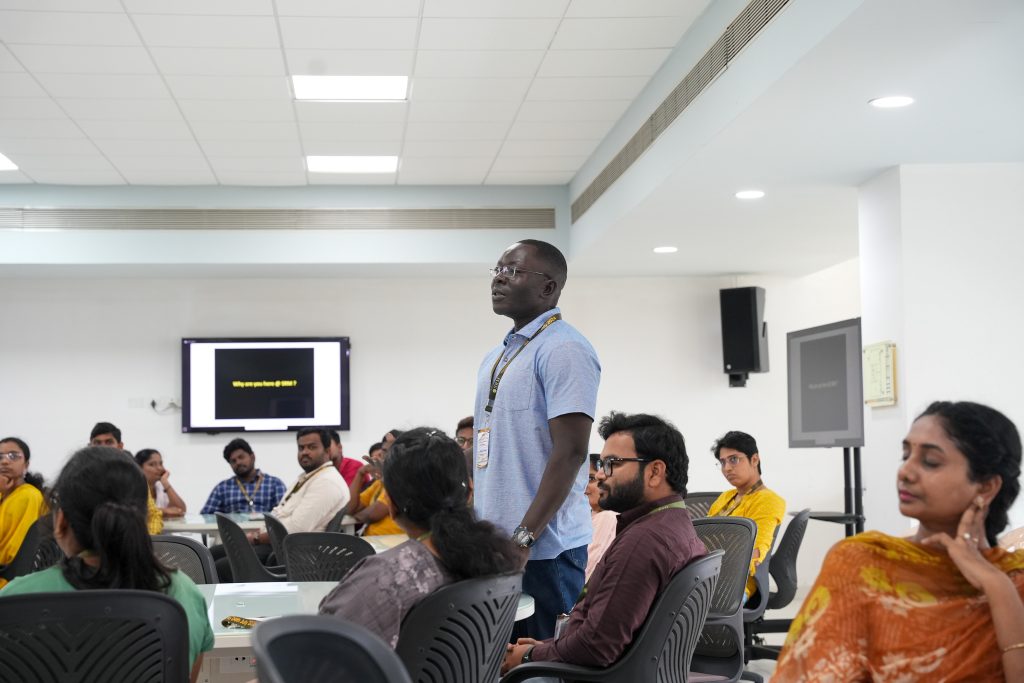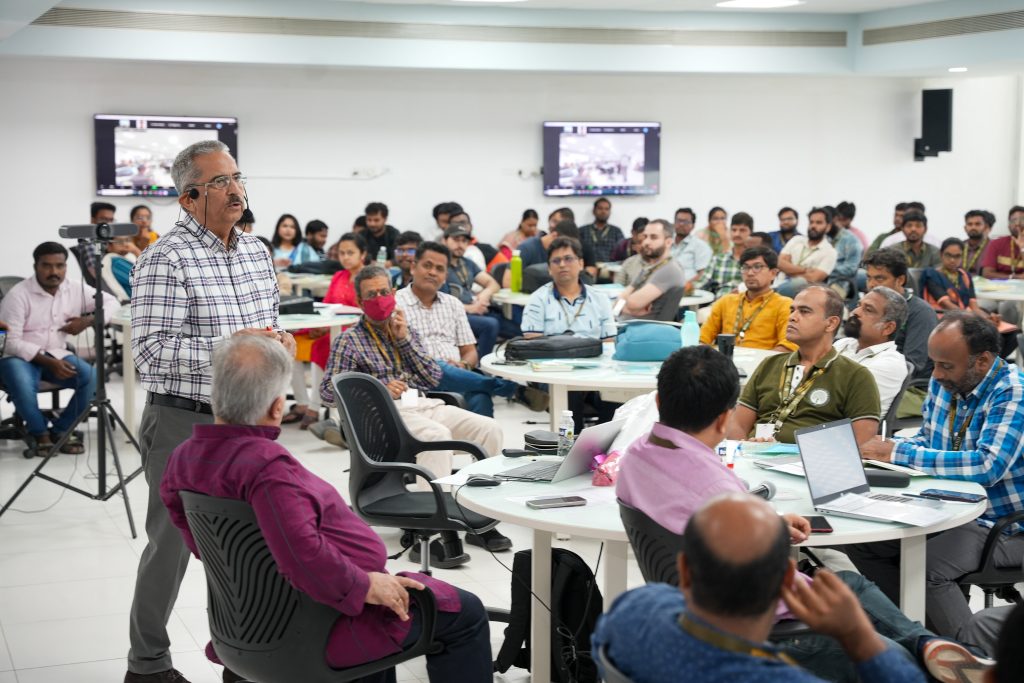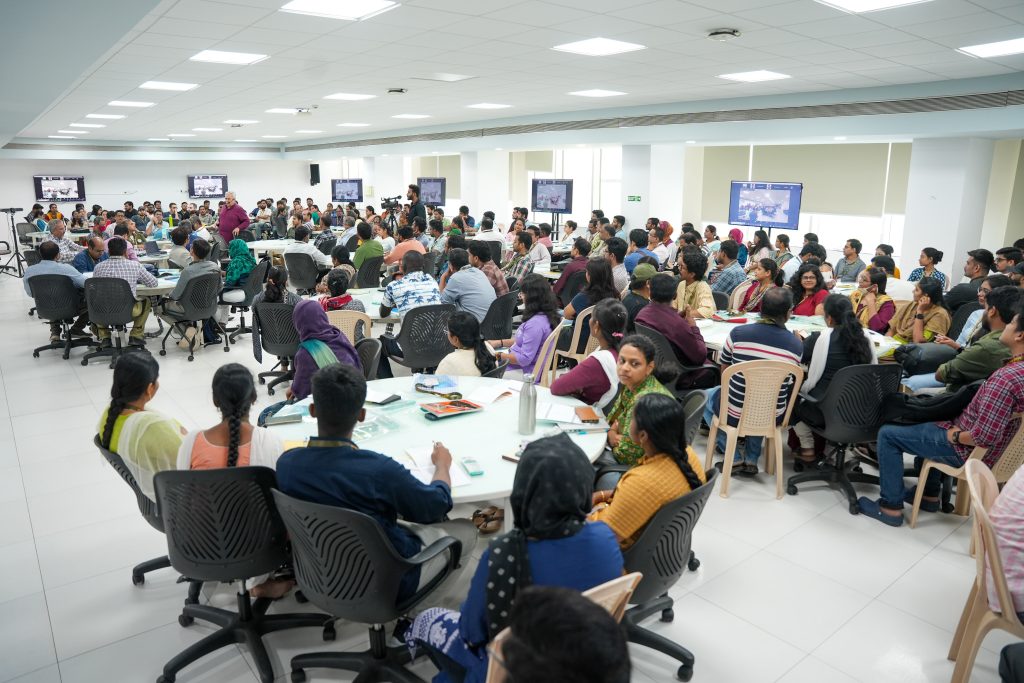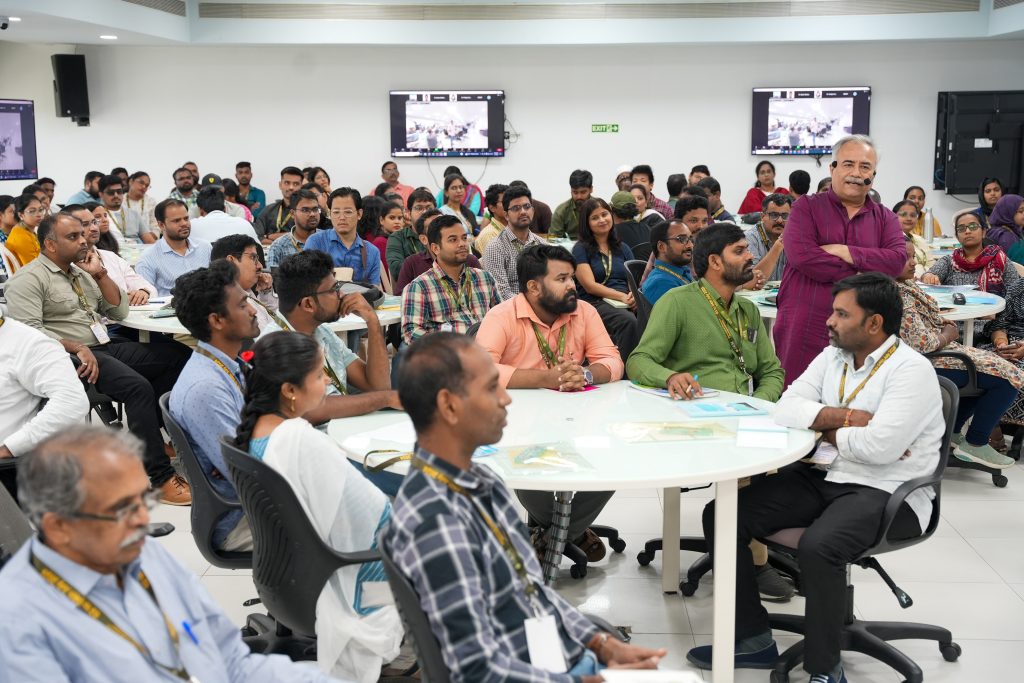Research to Revenue: 3-day Workshop Concludes
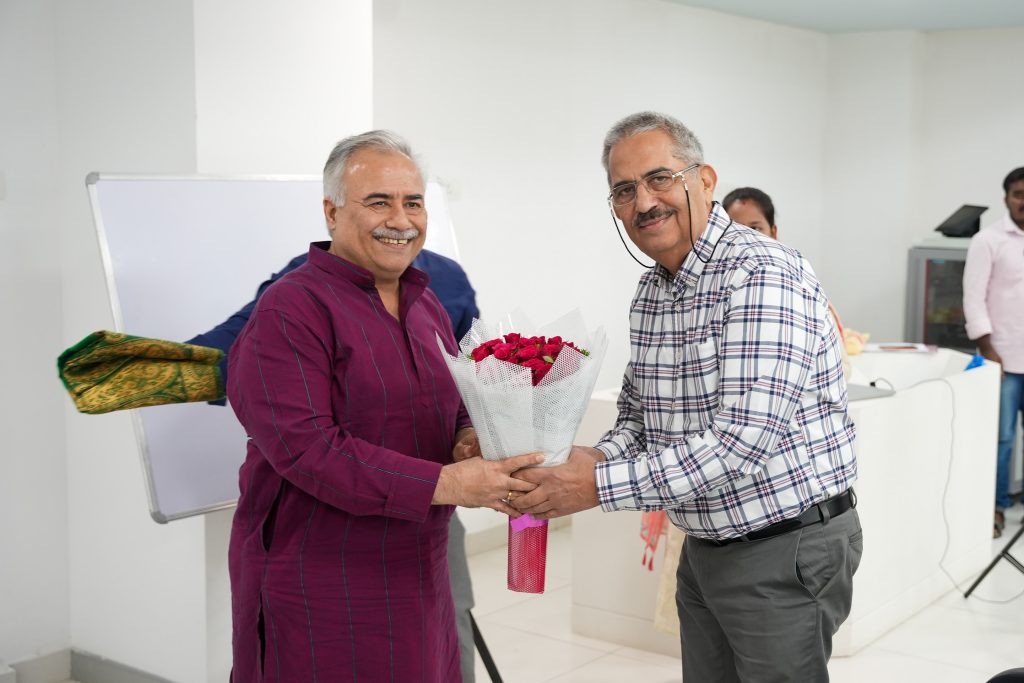 The Office of the Dean-Research and IPR Cell at SRM University-AP hosted a highly impactful 3-day Workshop on “Research Commercialisation.” The workshop was graced by industry expert Mr Rakesh Sharma, a leading figure in business restructuring and global marketing. Mr Sharma with his notable experience of 38 years at Philips, imparted valuable insights on innovation, venture development, and commercialisation.
The Office of the Dean-Research and IPR Cell at SRM University-AP hosted a highly impactful 3-day Workshop on “Research Commercialisation.” The workshop was graced by industry expert Mr Rakesh Sharma, a leading figure in business restructuring and global marketing. Mr Sharma with his notable experience of 38 years at Philips, imparted valuable insights on innovation, venture development, and commercialisation.
The workshop was attended by faculty and research scholars, all keen on understanding the intricacies of research commercialisation. The inaugural ceremony of the workshop was highlighted by the felicitation of Mr Sharma by the Vice Chancellor, Prof. Manoj K Arora, along with Prof. Ranjit Thapa, Dean—Research; Deans of the three schools; Prof. G S Vinodkumar, Coordinator—IPR Cell & Convenor of this workshop; and other senior faculty members.
In his address, Prof. Manoj K Arora underscored the critical role of research, he urged the attendees to “think differently and change your mindset to unlock the boundless potential of your research and innovation.” He engaged with faculty and research scholars, seeking their perspectives. Prof. Ranjith Thapa, the Dean of Research, presented an overview of the varsity’s research capabilities, spotlighting its achievements in Q1 publications and patents across different departments.
Day 1– The workshop kicked off with Mr Sharma encouraging participants to voice their queries and concerns about commercialisation. Key discussion points covered included linking university research with practical applications, the transformation of patents and research into industry-ready products, understanding market needs, fundraising for research projects, and leveraging humanities and liberal arts in patent implementation. Mr Sharma engaged with each of the queries and closely explained to the students with simple and easy-to-understand examples, thereby making the session worthwhile and interesting.
Day 2—Scholars had the opportunity to present their published and granted patents. They received constructive feedback from faculty and Mr Sharma and understood how these patents could be further developed for commercialisation, thereby leading to fruitful discussions on improving and materialising these ideas.
Day 3– A significant outcome of the workshop was the proposal to establish a new centre for research commercialisation designed to offer students an in-house pathway to commercialise their patents. This initiative received widespread acclaim from all participants and sparked engaging discussions about transforming research into viable business ventures, facilitated by the session by the Director of Entrepreneurship and Innovation, Mr Sidharth Shankar Tripathy.
The workshop offered a crucial platform for students, offering both inspiration and guidance in their pursuit of entrepreneurship. The event was specifically designed for all PhD Scholars who are currently working on their research papers and looking for ways to commercialise their innovative ideas, projects, or inventions.
Through a series of expert-led sessions, interactive discussions, and networking opportunities, students were encouraged to think critically about their project’s potential impact, market readiness, and the pathways to achieving sustainable business growth.
- Published in News, Research, Research News, Research Workshop, Workshop
Decoding BSc Mathematics with Subjects That Shape Your Career
BSc Mathematics is a comprehensive programme that offers a deep dive into various subject areas, shaping students’ understanding and expertise in the field of mathematics. Each subject plays a crucial role in developing analytical thinking and problem-solving skills, from foundational topics like calculus, algebra, and geometry to advanced areas such as differential equations, probability theory, and mathematical modelling.
As students progress through the curriculum, they encounter specialised BSc Mathematics subjects like fundamental analysis, complex analysis, and numerical methods, further enhancing their mathematical prowess.
Moreover, elective courses allow students to tailor their education to their interests and career aspirations, whether in pure mathematics, applied mathematics, or another specialised field. By navigating through these subjects, BSc Mathematics students gain a well-rounded education that prepares them for various career paths in academia, research, finance, data analysis, and beyond.
BSc Mathematics Subjects List
The subjects typically included in a BSc Mathematics programme may vary slightly depending on the university or college offering the course. However, some common subjects that are often part of the BSc Mathematics curriculum include:
- Calculus
- Algebra
- Geometry
- Differential Equations
- Probability Theory
- Statistics
- Real Analysis
- Complex Analysis
- Linear Algebra
- Number Theory
- Discrete Mathematics
- Numerical Methods
- Mathematical Modelling
- Operations Research
- Mathematical Physics
These subjects provide a comprehensive understanding of various mathematical concepts and their applications in different fields.
Year-wise BSc Mathematics Syllabus:
BSc Mathematics syllabus 1st year
Semester 1:
- Art of Listening, Speaking and Reading Skills
- Environmental Science
- Analytical Reasoning and Aptitude Skills
- Chemical Basis of Life
- Mathematics for the Physical World
- Fundamentals of Computing
- Emerging Technologies
Semester 2:
- Effective Writing and Presentation Skills
- Universal Human Values and Ethics
- Entrepreneurial Mindset
- Principles of management
- Psychology for Everyday Living
- Real Analysis
- Linear algebra
BSc Mathematics syllabus 2nd year
Semester-3
- Problem-Solving Skills
- Co-Curricular Activities
- Community Service and Social Responsibility
- Digital literacy
- Discrete Mathematics and Combinatorics
- Real Analysis -2
- Ordinary Differential Equation -1
- Algebra – 1 (Group Theory)
Semester-4
- Creativity and Critical thinking Skills
- Co-Curricular Activities
- Community Service and Social Responsibility
- Mathematical Modelling of Physical Data
- Complex Analysis
- Probability and Statistics
- General Topology
BSc Mathematics syllabus 3rd year
Semester-5
- Co-Curricular Activities
- Community Service and Social Responsibility
- Linear Programming Problem
- Real Analysis – 3
- Partial Differential Equations-1
- Numerical Analysis
- Number Theory and Introduction to Cryptography
Semester-6
- Co-Curricular Activities
- Community Service and Social Responsibility
- MATLAB, Sage and Mathematical
- Measure Theory (For Pure and Applied Math)/ Data Structures and Algorithms (For Data Science and Industrial Mathematics)
- Algebra-2 (For Pure Math/ Mechanics and Tensor Calculus (For Applied Math/ Applied Statistics (For Data Science and Industrial Mathematics)
BSc Mathematics syllabus 4th year
Semester-7
- Algebra -3 (Galois Theory) (for Pure Math)/ PDE – 2 (For Applied Math)/ Regression analysis (for Data Science and Industrial Mathematics)
- Operator Theory (For Pure Math)/ Dynamical Systems (For Applied Math)/ Stochastic process and Stochastic Differential Equations (For Data Science and Industrial Mathematics)
Semester-8
Internships and Research Projects
Jobs After BSc Mathematics
After completing a BSc Mathematics degree, graduates have a wide range of career opportunities available to them across various industries. Some common career paths for BSc Mathematics graduates include:
● Data Analyst
● Actuary
● Statistician
● Financial Analyst
● Operations Research Analyst
● Software Developer
● Market Research Analyst
● Teacher or Lecturer
● Risk Analyst
● Cryptographer
These are just a few examples of the diverse career paths available to BSc Mathematics graduates. The analytical, problem-solving, and critical thinking skills acquired during their studies make them valuable assets in a wide range of industries.
Shape Your Tomorrow with Numbers with B.Sc. Mathematics (Hons.) at SRM University-AP
The School of Engineering and Sciences at SRM University-AP offers B.Sc. Mathematics (Hons.) is a four-year undergraduate mathematics programme. Upon B.Sc. completion, students can seamlessly pursue PhDs domestically and internationally. The curriculum features robust foundational math courses alongside minors and open electives. From the sixth semester, students can specialise in three fields:
- Pure Mathematics,
- Applied Mathematics, and
- Data Science and Industrial Mathematics.
B.Sc. Mathematics (Hons.) Programme Highlights:
A diverse range of electives encompassing four advanced discipline-specific options. An undergraduate thesis project aimed at enhancing students’ mathematical abilities and facilitating admission to prestigious graduate programmes in the US and Europe.
Dedicated faculty provide personalised guidance and supervision for each undergraduate thesis.
The meticulously crafted curriculum instils confidence in students to excel in national and international-level mathematics competitive exams such as GRE, CSIR NET, NBHM, GATE, JAM, TIFR, ISI, CMI, etc.
Students specialising in Data Science and Industrial Mathematics will receive comprehensive industry-oriented training.
Long Story Short:
Mathematics continues to be a fundamental discipline with widespread applications across various industries and sectors. With the increasing demand for skilled professionals adept in mathematical concepts and techniques, pursuing a B.Sc. Mathematics (Hons.) degree opens doors to numerous rewarding career opportunities.
SRM University-AP offers a comprehensive programme that equips students with the knowledge and skills necessary to excel in this dynamic field. Join it in shaping the future of mathematics and embark on a fulfilling academic journey that will prepare you for success in the ever-evolving world of mathematics and beyond. Take the first step towards a promising career by enrolling in B.Sc. Mathematics (Hons.) at SRM University-AP today!
- Published in Academics, Admissions, Blog, Engineering, Math Blog, Sciences
Journey Through Time: Discovering BA History Course Details
Unearthing Histories: Explore BA History Course Details
History is the majestic tapestry upon which humanity paints its legacy. It’s a canvas woven with tales of triumphs, conflicts, and the evolution of societies. Studying history isn’t merely peering into the past; it’s an odyssey through the corridors of time, a journey that unveils the secrets of civilisations and the threads that connect the present to the bygone eras. It’s the cornerstone of understanding our world’s complexities. It is a multidimensional exploration that dissects the past through diverse lenses.
A Bachelor of Arts (BA) in History is an undergraduate degree programme focusing on the study of the past, exploring events, societies, cultures, and their evolution over time. Typically, it involves coursework covering various periods, regions, and themes in history. This course is a gateway to unravelling the mysteries of culture, power, and human behaviour, illuminating pathways to comprehend the present and shape the future. Also, it provides a foundation for various career paths, as mentioned earlier, by cultivating transferable skills highly valued in multiple sectors.
Moreover, movie houses have a high demand for history experts who can conduct research on costumes, jewellery, and movie sets. Collaborating closely with directors and cinematographers, these experts may also pursue roles as research analysts in production houses. Let’s dive into BA History course details.
BA History Course Details
BA History Eligbility:
The typical eligibility requirements for a Bachelor of Arts (BA) in History include:
- Completion of 10+2 or an equivalent from a recognized board like CBSE or ICSE
- Attainment of at least 50% aggregate marks in the qualifying examination
- Acceptance of students from any academic stream into the BA History program
- Some universities might stipulate prior study of History at the 10+2 level.
Preference is often given to candidates from a Humanities background. Individual institutes may have unique eligibility criteria. For instance, DU Admissions mandates that applicants have passed Mathematics at the qualifying level.
BA History Duration:
The BA History programme spans three years and delves into the evolution of human civilization across ancient to modern eras. Exploring diverse cultures, it scrutinizes both the accomplishments and shortcomings, unravelling the tapestry of achievements and setbacks throughout history.
Jobs After BA History
A BA in History can open doors to various career paths due to the skills it develops, such as critical thinking, research, analysis, and communication. Some career options include:
- Museum Curator/Archivist
- Historical Researcher
- Education
- Journalism/Writing
- Government & Public Service
- Librarian
- Heritage Manager
- Consultancy/Analysis
Many careers might require further education, specialized training, or internships. Consider supplementing your BA with internships, certifications, or even pursuing higher education like a Master’s or Ph.D. in History or related fields to enhance your prospects in certain career paths.
BA (Hons) in History at SRM University-AP – Nurturing Legacy Explorers
The School of Liberal Arts and Social Sciences at SRM AP presents a BA (Hons.) in History, aiming to provide students with comprehensive knowledge of global and Indian history. The programme challenges the conventional view of history as a mere chronicle of dates and personalities.
Emphasizing diverse perspectives on historical events encourages critical thinking and analysis. Through intensive reading and tutorial sessions, students engage deeply with historical texts, fostering a nuanced understanding. Evaluation at SRM University-AP emphasizes presentations, ensuring a dynamic and insightful exploration of the multifaceted nature of history.
BA History Subjects List at SRM University-AP
Semester 1:
• Art of Listening, Speaking, and Reading Skills
• Environmental Science
• Digital Literacy
• Understanding Indian Society(ies): Myths and Realities
• Understanding the Indian Constitution
• Understanding Human Minds
• Emerging Technologies
Semester-2:
• Effective Writing and Presentation Skills
• Universal Human Values and Ethics
• Analytical Reasoning and Aptitude
• Economics in Everyday Life
• Data Analytics for Social Sciences
• Human Civilizations
Semester-3:
• Creative and Critical Thinking Skills
• Co-Curricular Activities
• Community Service and
• Social Responsibility
• Entrepreneurial Mindset
• Middle Ages in Europe
• European Social Formations
Semester-4:
• Leadership and Teamwork
• Community Service and Social Responsibility
• Social Entrepreneurship
• Early Medieval India
• Medieval India (1200-1500)
• History of Central Islamic Lands
• Age of Revolutions and National Liberation
Semester-5:
• Community Service and Social Responsibility
• Career Skills- I
• Medieval India – II
• Introduction to Colonial Latin America and the Caribbean
• Economic History of Modern India (1757-1947)
Semester-6:
• Community Service and Social Responsibility
• Entangled Histories
• Understanding Caste
• Society, Politics, and Economy: India After Independence
• Introduction to Colonial Africa
Semester 7 & 8:
• Seminars and Dissertation
Wrapping Things Up
Take up an illuminating journey through the annals of time with SRM University-AP’s BA (Hons) History programme. The multidimensional curriculum doesn’t just decode the past; it fosters critical thinking and analysis. Join the university to explore diverse perspectives and unveil the rich tapestry of history. Embrace a future shaped by a nuanced understanding of civilizations. Start your transformative journey by applying today.
- Published in Academics, Blog, Liberal Arts
Building Beyond Boundaries: Enroll in BTech in Civil Engineering
Design, Build & Thrive with a BTech in Civil Engineering
The field of civil engineering is experiencing a surge in demand. According to the Bureau of Labor Statistics, there’s an anticipated 5% growth in civil engineering employment from 2022 to 2032, surpassing the average for all occupations. On average, approximately 21,200 job opportunities for civil engineers are expected each year throughout the decade.
Civil engineering professionals are involved in designing and building various infrastructures, including buildings, bridges, water systems, and transportation systems. Additionally, they tackle environmental issues such as pollution and land use. So, if you wish to make your future in this field, you must go for the BTech in Civil Engineering degree.
At its core, BTech Civil Engineering is a comprehensive programme that delves into the principles, theories, and practical applications of civil engineering. Students are equipped with a profound understanding of structural engineering, geotechnical engineering, transportation engineering, environmental engineering, and water resources engineering. Let’s have a look at the eligibility criteria and the duration of the BTech in Civil Engineering course.
B.Tech Civil Engineering Eligibility
The requirements for admission to a BTech programme in Civil Engineering can differ among institutions. However, common eligibility criteria typically encompass:
.Attaining a minimum of 50% marks in Mathematics, Physics, and Chemistry/Biology during the 10+2 academic level
.Achieving an overall qualifying score of at least 50% in the 10+2 examinations
.Having an educational background in a Science-related stream
Various popular entrance exams for admission to B.Tech in Civil Engineering comprise TANCET, JEE MAIN, JEE Advanced, BITSAT, and VITEEE.
B.Tech in Civil Engineering Duration
The duration of a BTech in Civil Engineering typically spans four years. During these four years, students undergo a structured curriculum that combines theoretical learning with practical applications, culminating in the acquisition of a comprehensive understanding of civil engineering principles and practices. The program’s duration may vary slightly among institutions, but a four-year timeframe is the standard for most B.Tech in Civil Engineering programmes.
BTech in Civil Engineering Jobs
A Bachelor of Technology (BTech) in Civil Engineering opens up a wide array of job opportunities in various sectors. Here are some potential career options after BTech in Civil Engineering:
- Civil Engineer
- Structural Engineer
- Transportation Engineer
- Environmental Engineer
- Geotechnical Engineer
- Construction Manager
- Water Resources Engineer
- Urban Planner
- Project Manager
- Consulting Engineer
- Construction Estimator
- Researcher or Educator
These are just a few examples, and the versatility of a B.Tech in Civil Engineering allows graduates to explore and specialise in different areas based on their interests and expertise. Additionally, as the field continues to evolve, new and exciting job opportunities may emerge, especially with the increasing focus on sustainable and innovative engineering solutions.
Constructing Dreams, Shaping Futures: BTech Civil Engineering Course at SRM University-AP
The School of Engineering and Sciences at SRM University-AP, offers a Bachelor of Technology in Civil Engineering. The university places a strong emphasis on educating the upcoming cohort of civil engineers, recognising its pivotal role in enhancing services to society. The university’s mission and activities revolve around three key pillars: Teaching, Research, and Service. Each facet of this mission is driven by the overarching goal of improving the student experience. The School has witnessed a surge in research activities, aiming to provide undergraduate students with enhanced opportunities to emerge as exceptional leaders in their chosen fields.
Objectives of BTech Civil Engineering Course at SRM University-AP
Establishing a proficient pool of future civil engineering professionals is essential at both the postgraduate and undergraduate levels, catering to diverse sectors like private industry, government agencies, educational institutions, and research and development offices
Equipping students with the skills needed to operate as independent civil engineering consultants capable of addressing real-world challenges through their acquired management, analytical, and research abilities.
Instilling interdisciplinary knowledge, fostering innovation and entrepreneurship in a diverse educational environment.
Bringing It All Together
The BTech in Civil Engineering programme at SRM University-AP, is your gateway to a dynamic and rewarding career in a field that is witnessing substantial growth. With the anticipated surge in demand for civil engineers and the diverse career options available, pursuing this degree becomes a strategic investment in your future. Moreover, if you aspire to contribute to the design and construction of essential infrastructure, tackle environmental challenges, and become a leader in the field, now is the time to embark on your BTech in Civil Engineering journey at SRM University-AP. Explore the possibilities, and join us in building a world where innovation, sustainability, and excellence converge in the exciting realm of Civil Engineering at SRM University-AP. Your journey to becoming an exceptional leader in the field begins here.
- Published in Admissions, Blog, Engineering
Explore the Human Mind and Behavior with the BSc Psychology Programme
Know and Apply! Psychological theory, Research and Practice with BSc Psychology degree
School of Liberal Arts and Social Science, SRM AP
The BSc Psychology programme is a captivating journey into the intricate world of the human mind and human behaviour. It’s a dynamic exploration of what makes us tick, why we behave the way we do, and how we can better understand ourselves and others.
Psychological science and the demand for psychologists in different fields is exponentially growing. The post Covid era has seen acceptance in active improvement in mental health practices and is not limited to treatment of psychological disorders and counselling. It extends to refining various professional domains such as military, sports, forensic sciences, education, organisational behaviour, developmental sciences, health behaviour, nutrition, artificial intelligence, and so on!

At SRM AP, students are nested in a modern and beautiful campus with updated infrastructure in the classrooms and an ever-improving laboratory. They are geared towards future-oriented research, comprehensive multidisciplinary approach in education, and are prepared to complete the course with a superior sense of mastery and achievement as graduates of BSc Psychology degree.
BSc Psychology Programme Details
The BSc Psychology programme is a holistic understanding towards the study of mental processes, emotions, and human behaviour and how it fits in the society, Let’s find out the eligibility of the course, its duration, and the subjects taught throughout the programme.
BSc Psychology Eligibility
To be eligible for a BSc in Psychology, you must meet the following criteria:
- Pass the 10+2 or equivalent exam from a recognised board with a minimum aggregate of 50% marks
- Complete a diploma course after passing class 10
- Be between 17 and 35 years old
- Preferable to have studied Psychology at the +2 level (Not mandatory)
Now, let’s move ahead, looking into the duration of the course.
BSc Psychology Duration
A Bachelor of Science (BSc) in Psychology programme typically has a duration of three years (for BSc degree) to four years (for BSc Psychology Hons .degree). This would enable students to pursue their academic goals at the global platform as well.
The BSc Psychology course covers a variety of subjects, including:
- Foundations of human behaviour
- Biological psychology
- Social psychology
- Developmental psychology
- Organisational behaviour
- Psychological disorders
- Organisational psychology
- Statistics in psychology
- Counselling psychology
- Health psychology
- Forensic Psychology
- Research Methodology
- Statistics for Social Sciences
Why BSc Psychology at SRM University-AP?
The School of Liberal Arts and Social Sciences at SRM University-AP, Andhra Pradesh, offers an undergraduate programme in Psychology. The School boasts of faculty from various reputed Universities having diverse specialisations and a rich record of research publications. The School encourages students to engage in experiential learning and context based learning with an option to explore their interests across disciplines. The students are actively supported in their endeavours to gain internship opportunities and research experience.
Interested? Reach out to us!
The BSc Psychology programme at SRM University-AP, offers an enriching and comprehensive journey into the fascinating realm of psychology. Through a well-rounded curriculum and dedicated faculty, students gain a profound understanding of the human mind and its intricacies. The programme not only equips them with the knowledge and skills to excel in various psychology subfields but also instils a scientific approach to understanding the mind-body connection.
Graduates emerge from this programme well-prepared to embark on diverse career paths in psychology, armed with the confidence and competence to make a meaningful impact on individuals and society. SRM University-AP, provides an ideal platform for aspiring psychologists to flourish and contribute positively to the world of psychology and beyond. Join now and embark on your journey to a rewarding career.
- Published in Admissions, Blog, Psychology
Cracking the Code: MTech Computer Science Eligibility Criteria
Exploring the MTech Computer Science and Engineering Eligibility: Prerequisites & Entry Requirements
Are you someone who has just completed your BTech in Computer Science and Engineering? And you do not want to get into a job as you wish to explore the world of technology even more in order to gain mastery in it? If yes, then you must pursue MTech in Computer Science and Engineering.
MTech in CSE is a 2-year post-graduation degree in engineering. The course equips the students with the ability to understand the fundamentals and the advanced principles of science and technology. However, you must fulfil the MTech in CSE eligibility criteria.
In the sections below, you can find a detailed overview of what criteria are needed to get yourself enrolled for MTech in CSE.

Educational Qualification Needed for MTech in CSE
The educational qualifications typically required for admission to an MTech (Master of Technology) in Computer Science and Engineering programme include:
- Bachelor’s Degree: Candidates must hold a Bachelor’s degree in Computer Science, Computer Engineering, Information Technology, or a closely related field. The degree should be from a recognised university or institution.
- Minimum Percentage: Most universities and institutions require candidates to have a minimum aggregate percentage in their undergraduate degree, usually ranging from 55% to 60%. However, the exact minimum percentage requirement may vary between institutions.
- Relevant Background: A strong foundation in computer science subjects is essential. Candidates should have completed courses in areas such as data structures, algorithms, computer networks, operating systems, database management, programming languages, and software engineering.
- Entrance Exams: Many universities and institutions conduct entrance exams for admission to MTech programs. In India, popular entrance exams for MTech in Computer Science include the Graduate Aptitude Test in Engineering (GATE) and some state-level or university-specific entrance exams.
- GATE Qualification: GATE scores are widely accepted by several institutions for MTech admissions. Candidates with a valid GATE score in Computer Science or related disciplines may have an advantage during the selection process.
It’s important to note that MTech CSE eligibility criteria may vary between institutions and can change from year to year. Therefore, it is recommended that students check with the university or institution offering the MTech in Computer Science and Engineering programme to obtain the most accurate and up-to-date information regarding their eligibility requirements.
Subject Required to Pursue MTech in CSE
The subject requirements for eligibility for MTech (Master of Technology) in Computer Science and Engineering can vary between universities and institutions. However, here are some common subject areas that are often considered prerequisites or preferred background knowledge for admission to an MTech in Computer Science and Engineering programme:
- Computer Science Fundamentals: This includes subjects such as data structures, algorithms, computer architecture, operating systems, databases, and programming languages.
- Mathematics: Topics such as discrete mathematics, linear algebra, calculus, and probability theory are relevant to many areas of computer science.
- Programming: Proficiency in programming languages is typically expected, with a focus on languages commonly used in the field of computer science, such as C, C++, Java, Python, or others.
- Computer Networks: Basic knowledge of computer networks, protocols, and network architectures is often required, as computer networks are integral to many areas of computer science.
- Data Structures and Algorithms: Familiarity with various data structures and algorithmic concepts is important, as they form the basis for efficient problem-solving and software development.
- Database Management Systems: Knowledge of database concepts, SQL, and database design principles is often considered important, as databases play a significant role in many computer science applications.
Moreover, some institutions may provide bridging courses or foundation programmes to help students meet any subject requirements they may be lacking.
If you are confused about which university to go with for your advanced courses, such as MTech in Computer Science and Engineering, you can opt for SRM University-AP.
Master the World of Technology with an MTech in Computer Science and Engineering at SRM University-AP
SRM University-AP, is a private university located in the state of Andhra Pradesh, India. The University offers a wide range of undergraduate, postgraduate, and doctoral programmes across various disciplines, including engineering, management, science, humanities, law, and more.
The MTech in Computer Science and Engineering programme at SRM University-AP offers specialisations in Artificial Intelligence & Machine Learning, Data Science and Cyber Security. The curriculum is designed keeping in mind the industry’s demands. After completing the programme, students can choose to work in the industry or pursue a PhD. The course is taught by highly qualified faculty with overseas exposure to research and teaching.
MTech in Computer Science and Engineering Eligibility Criteria @ SRM University-AP
There is a specific MTech in CSE eligibility criteria at SRM University-AP. The candidates must have a degree or equivalent in:
- BE
- IT
- BTech in CSE
- SWE (or) MSc (IT/CSE) (or) MCA with GATE
Now, if you find yourself eligible to enrol for the MTech in Computer Science and Engineering, you must be thinking about the fee structure of the courses. You can find the related details in the below-discussed section.
MTech in CSE Fee Structure at SRM University-AP
Here are the details on the SRM University-AP MTech Computer Science and Engineering fee structure:
- The annual tuition fee for MTech in CSE is 1.5 Lakh rupees.
- As a scholarship, 100% of tuition is waived.
- Also, there is an additional admission fee of Rs. 10,000/-. This is non-refundable.
- Moreover, there is an additional training and development fee of Rs. 10,000/-
Apart from this, the University has a dedicated placement cell that assists students in their career development and placement activities. It has a strong network of recruiters from diverse industries. Moreover, SRM University-AP, offers a vibrant campus life with a range of extracurricular activities, clubs, and sports facilities. Students have opportunities to explore their interests, enhance their skills, and engage in cultural and social events. If you are looking for all of these, enrol at SRM University-AP now and accelerate your tech career.
- Published in Blog, Engineering
Unleash Your Tech Genius with Trending BTech CSE Subjects
Ignite Your Passion for Coding & Computers with Immersive BTech CSE Subjects
The emergence of computers has altered the way we communicate, make choices, and lead our lives. This revolution is evident across multitudes of domains, incorporating entertainment, medicine, transport, and education.
In the current scenario, Computer Science & Engineering (CSE), an amalgamation of Computer Science and Computer Engineering, stands as a significant paradigm shift. It has become the driving force behind technological innovations, shaping the world we inhabit.
As technology continues to thrive, CSE engineers have positioned themselves at the forefront of developing cutting-edge solutions, pushing the boundaries of what is possible. The demand for CSE engineers is soaring, thanks to advancements in data science, big data, artificial intelligence, and machine learning.
Also, as per the Bureau of Labor Statistics (BLS) report, employment rates for Computer Science Engineers are projected to grow by 5% between the years 2021 to 2031.
If you have excelled in your 12th-grade studies and possess a passion and knack for shaping the future with your exceptional skills, pursuing a BTech in Computer Science and Engineering would be an optimal choice.

What is a BTech in CSE?
A Bachelor of Technology in Computer Science and Engineering is an undergraduate degree of four years equipping aspiring candidates with in-depth knowledge and skill sets of computer science principles and computer engineering concepts to become highly skilled in Software, Mobile Applications, Programming languages, etcetera. In the span of 4 years, students will dwell and master multitudes of BTech CSE subjects, for example-
- Algorithms
- Data Structure
- Computer Networks
- Artificial Intelligence
- Programming
- Software Engineering
And so on!
There is no denying that the curriculum of BTech in CSE equips candidates with the desired skill sets that laid the foundation of their inspirational professional journey.
Is There Any Scope After Pursuing a BTech Degree in CSE?
Indeed, there is! Computer Science and Engineering (CSE) is an exponentially versatile and highly in-demand field with a massive scope of career opportunities. CSE encircles the design, development, and deep analysis of computer frameworks, applications and software. Below are the potential key areas that fall under the scope of Computer Science and Engineering courses:
- Cybersecurity
- Computer Networks
- Computer Architecture
- Operating Systems
- Database Management Systems
- Programming and Software Development
- Data Science and Big Data Analytics
- Web Development and Mobile Applications
- Artificial Intelligence and Machine Learning
As the field is constantly evolving and new technologies and domains emerge regularly, there are numerous career opportunities for CSE professionals in software development, IT consulting, research and development, data analysis, and cyber-security, to name a few.
What is the BTech Computer Science and Engineering Syllabus?
The BTech CSE subjects usually incorporate core subjects and electives, along with practical elements. However, the exact BTech CSE subjects semester-wise may vary depending on the university and chosen electives. Below are some of the many BTech Computer Science and Engineering subjects you will master during your course. Keep reading to know BTech CSE subjects in the 1st year till the 4th.
- Communicative English
- Single Variable Calculus
- Statistics
- Critical Thinking
- Discrete Mathematics
- Linear Algebra
- Operating System
- Software Engineering
Unveil Your Potential with BTech in Computer Science and Engineering Programme at SRM University-AP
One of the pioneers, SRM University-AP, solely aims to create and impart knowledge and come up with an idiosyncratic learning experience for aspiring candidates who are technologically advanced and have emerged as an efficacious resource to society.
At SRM University-AP, the Department of Computer Science and Engineering is at the forefront of the constantly evolving tech revolution, driven by a solid commitment to empowering and enabling students with the in-depth knowledge and skills required to thrive in the digital era.
With a dynamic curriculum designed to match the pace of technological advancements, the Department equips aspiring engineers with a deep understanding of cutting-edge software and hardware mechanisms.
Via hands-on experiences, collaborative projects, and industry interactions, candidates gain practical expertise, educating and training them to handle real-world challenges with precision.
Moreover, the Department fosters a culture of innovation, boosting students’ confidence to think and go out of their comfort zone. BTech in Computer Science and Engineering is amongst the most coveted programmes as the Department of Computer Science and Engineering offers research-based education and follows Active Learning to enhance the quality of learning.
The University has introduced high-tech laboratories to motivate students to take up interdisciplinary projects, providing students with a golden opportunity to get international exposure in reckoned institutions, such as:
- Northeastern University
- Flinders University
- The University of Wisconsin-Madison
- Asia University
The Department of Computer Science and Engineering at SRM University-AP wraps up several computer software as well as hardware topics which are taught by well-versed faculty. Some of the specialisations offered are-
- Internet of Things (IoT)
- Big Data Analytics
- Cyber Security
- Artificial Intelligence and Machine Learning
- Distributed and Cloud Computing
The BTech CSE students at SRM University-AP, are provided with a research-centric quality education that will help them succeed in the contemporary world. Additionally, the BTech CSE fee at SRM University-AP, can range from Rs. 33,500 to Rs. 3,35,000, depending on the merit of the students.
To Sum Up
A BTech in Computer Science and Engineering is an entranceway to a world of enthralling possibilities, where human beings can be at the forefront of technological advancements, drive innovation, and create a significant difference in the way we live, work, and connect with each other. So, don’t think much; enrol now at SRM University-AP and remould the technological world.
- Published in Blog, Engineering
Explore BTech in Mechanical Engineering Subjects in Detail
Design, Build, & Innovate with Cutting-Edge BTech in Mechanical Engineering
Mechanical engineering is a broad field with applications in many industries, including manufacturing, aerospace, automotive, and energy. The countries with the highest demand for mechanical engineers are China, the United States, Germany, France and now India due to the Make in India initiative.
Some sectors with high demand for mechanical engineers include Aerospace, Automotive engineering, Energy Sector, the Chemical industry, Electronics system design and manufacturing, Construction and Projects industry, Railway/Shipping industry.
The Bureau of Labor Statistics projects that the employment of mechanical engineers will grow by 4% from 2019 to 2029. This is about as fast as the average for all occupations.
If you are interested in the field, you can choose to study BTech in Mechanical Engineering subjects in your graduation, seeking a good career hereafter.
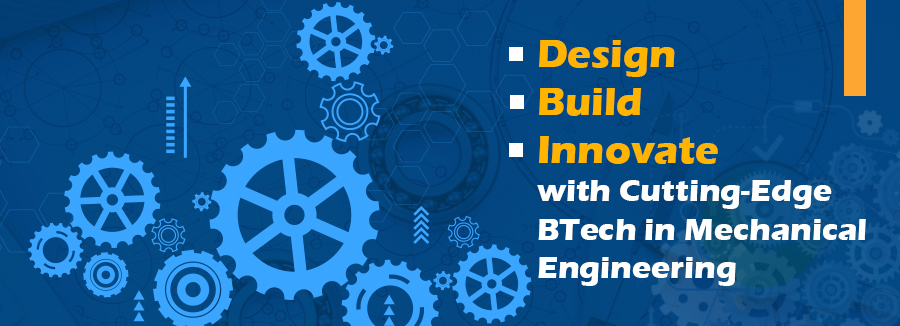
BTech in Mechanical Engineering Subjects
The specific subjects and their sequence in a BTech in Mechanical Engineering programme can vary depending on the university and curriculum. However, in the section below, you can go through the general overview of the year-wise subjects typically covered in a four-year BTech in Mechanical Engineering programme:
BTech Mechanical Engineering Subjects 1st Year
- Engineering Mathematics I
- Engineering Physics
- Engineering Graphics
- Computer Programming
- Environmental Studies
- Workshop Practice
- Engineering Mathematics II
- Basic Electrical Engineering
- Engineering Mechanics
- Basic Electronics Engineering
- Communication Skills
BTech Mechanical Engineering Subjects List 2nd Year
- Engineering Mathematics III
- Thermodynamics
- Fluid Mechanics
- Materials Science
- Manufacturing Technology
- Strength of Materials
- Kinematics of Machinery
- Electrical and Electronics Engineering
- Numerical Methods
- Environmental Science and Engineering
- 3D Printing
- Design thinking and product design
- Digital Manufacturing
BTech Mechanical Engineering Subjects List 3rd Year
- Heat and Mass Transfer
- Machine Design
- Dynamics of Machinery
- Industrial Engineering and Management
- Mechatronics
- Control Systems
- Finite Element Analysis
- Metrology and Measurements
- Elective Courses (e.g., Robotics, Automotive Engineering, Energy Conversion, etc.)
- IOT and Digital Twins for mechanical engineers
- AI and ML for mechanical engineers
BTech Mechanical Engineering Subjects 4th Year
- Advanced Thermal Engineering
- Mechanical Measurements and Instrumentation
- CAD/CAM
- Automation and Robotics
- Electric vehicles
- Additive manufacturing
- Project Work
- Elective Courses (e.g., Composite Materials, Computational Fluid Dynamics, Additive Manufacturing, etc.)
- Industrial Training
- Seminar and Technical Presentation
- Elective Courses
- Engineering Economics and Cost Analysis
Please note that this is a general guideline, and the specific subjects and their order may vary from one institution to another. Additionally, some institutions may offer elective courses and specialised tracks, allowing students to tailor their studies to their interests and career goals. It’s essential to consult the specific curriculum provided by the university you are interested in for the most accurate and up-to-date information.
Are BTech in Mechanical Engineering Subjects Tough?
Mechanical engineering is considered one of the most challenging undergraduate degrees. It’s also one of the most diverse fields of engineering. Mechanical engineers deal with the fundamental laws of physical nature, such as force, motion, and energy.
Some say that mechanical engineering is slightly tough because you have to study numerical-based questions. Others say that mechanical engineering is easy to study because you can see its real application in day-to-day life.
In short, mechanical engineering can be a little tough if you don’t like to do physical work or aren’t interested in doing experiments, building models.. Otherwise, mechanical engineering subjects are easy.
Embark on Your Journey to the World of Mechanical Engineering with the BTech Mechanical Engineering Programme at SRM University-AP
Mechanical engineering serves as a cornerstone for all branches of engineering, and the School of Engineering and Sciences at SRM University-AP, is dedicated to delivering top-tier education in the diverse realms of mechanical engineering. The esteemed faculty, renowned for their expertise and experience, engages in cutting-edge research to address the fundamental requirements of the world with innovative solutions.
At SRM University-AP, students have the opportunity to delve into multifaceted areas of mechanical engineering research, including materials and composites, thermodynamics and fluids, dynamics and control, and advanced manufacturing, among others.
Objectives of BTech Mechanical Engineering @ SRM University-AP
- To provide students with the highest calibre of education, nurturing their capabilities and honing their skills to shape them into globally competitive mechanical engineers.
- To uphold cutting-edge research facilities, fostering a collaborative atmosphere that inspires faculty, staff, and students to generate, scrutinise, employ, and share knowledge.
- To forge partnerships with premier R&D organisations, educational institutions, industry leaders, and alumni to excel in teaching, research, and consultancy endeavours.
- To offer students an academic environment characterised by excellence, leadership, ethical principles, and lifelong learning, essential for a successful and enduring career.
In a Nutshell
Pursuing a BTech in Mechanical Engineering opens doors to a world of innovation, problem-solving, and limitless possibilities. As you begin your educational journey, you’ll acquire a strong foundation in the principles of mechanics, thermodynamics, materials science, and more.
The programme equips you with the skills and knowledge needed to design, analyse, and optimise mechanical systems, laying the groundwork for a dynamic and rewarding career in various industries, from aerospace to automotive energy to manufacturing.
Moreover, the ever-evolving field of mechanical engineering offers endless opportunities for research, innovation, and global impact. So, if you have a passion for technology and a drive to shape the future, a BTech in Mechanical Engineering is your gateway to a world of boundless engineering possibilities.
- Published in Blog, Engineering
Crack the Code of Success with the BSc Mathematics Course
Your Gateway to a World of Exciting Career Opportunities
In this rapidly evolving world, one constant that has always stood at the forefront of human progress is Mathematics. Usually addressed as the universe language, its value has expanded beyond solving equations or deciphering intricate theorems. Believe it or not, the backbone of advancement is Mathematics, making way for cutting–edge innovations in technology, science, and, of course, our day-to-day lives. As we rush towards the future, the imperativeness of Mathematics becomes even more pronounced. In the world of artificial intelligence, algorithms fuelled by mathematics principles allow machines to learn, adapt, and jump to autonomous decisions.
Whether related to self-driven cars or customised medical treatments, Mathematics is the “X” factor behind these recasting developments.
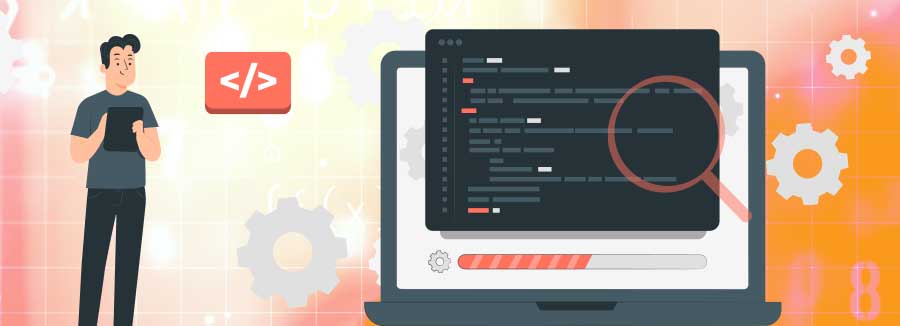
Believe it or not, the global economy thrives on data, and mathematics motivates us to extract information from data for meaningful insights. Financial institutions utilise mathematical models for introspecting market trends and handling risks. Besides technological and economic implications, mathematics promotes and fosters critical thinking and problem-solving skills. It motivates you to unleash your creativity to reveal the mystery of the universe. Be it from deciphering the cosmos via astrophysics to ravelling secrets of our DNA via genetics, Mathematics gives us the tools to dig deeper and precisely understand the world around us.
Moreover, it is a universal language promoting collaborations and cooperation amongst scientists, engineers, and researchers worldwide, accelerating the pace of discovery and innovation.
Thus, if you love playing with digits, make maths your superpower by enrolling in a BSc Mathematics programme from the best University that fulfils your desire to emerge as the hero of innovation and problem-solving.
BSc Mathematics is amongst the most sought-after courses for candidates after 12th. It has massive scopes and career options, such as mathematics equations, which are used in every step of life.
Scope of BSc Mathematics
A BSc in Mathematics offers a broader range of opportunities and a promising scope for graduates in many fields. Below are a couple of the key aspects of the scope of BSc Mathematics:
- Engineering
- Academic Pursuits
- Teaching and Education
- Actuarial Science
- Data Science and Analytics
- Financial Services
- Computing and Technology
- Operations Research
These are some of the many scopes of BSc Mathematics. However, this is not it; there is much to explore in the course.
Career Options After BSc Mathematics
A BSc in Mathematics opens up a plethora of exciting and diverse career options for graduates. Below are some popular career paths that can be pursued:
- Actuarial Analyst
- Teaching and Academia
- Data Analyst/Scientist
- Financial Analyst
- Market Research Analyst
- Operations Research Analyst
- Statistical Analyst
- Software Developer
The amalgamation of analytical thinking, problem-solving skills, and mathematical expertise opens doors to multitudes of industries and fields where their contributions are highly valued.
Moreover, several high-salaried career paths are available to students after completing BSc Mathematics. Listed below are high-salary courses after BSc Mathematics:
- Master’s in Actuarial Science
- Master’s in Financial Engineering
- Master’s in Quantitative Finance
- Master’s in Applied Mathematics
- Master’s in Pure Mathematics
- Master’s in Computer Science
- Master’s in Data Science or Data Analytics
Subjects in BSc Mathematics
Some of the subjects covered under a BSc Mathematics degree are –
- Mathematics for the Physical World
- Real Analysis
- Probability and Statistics
- Algebra
- Linear Algebra
- Complex Analysis
- Number Theory
- Programming Language Concepts
- Measure Theory
- Optimization Techinique
Open the Door to Endless Possibilities with the BSc Mathematics Programme at SRM University-AP
The BSc in Mathematics programme at SRM University-AP is precisely curated to instil an in-depth understanding of multitudes of mathematical disciplines, readying candidates for endless possibilities. The curriculum is thoughtfully structured, ensuring a magnificent blend of theoretical knowledge and practical applications. From fundamental calculus and algebra to innovative topics, such as number theory and mathematical modelling, this course wraps up a wide spectrum of mathematical fields.
Amongst others, one of the highlights of the BSc Mathematics programme is the emphasis on problem-solving and critical thinking. Mathematics is not just about memorising formulas but developing a keen analytical brain to solve real-world challenges. SRM University-AP fosters this skill by encouraging aspirants to engage in hands-on projects, group discussions, and research opportunities that allow them to apply their knowledge to real-life scenarios.
A programme is only as good as its faculty, and SRM University-AP takes great pride in its exceptional team of professors and mentors. The faculty members at SRM University-AP are highly skilled with immense experience and expertise in numerous mathematical domains, and their passion for teaching ignites the same flame of curiosity in their students. They ensure to go the extra mile so that the students can grasp the nuances of mathematics, making the learning process informative and enjoyable. Below mentioned are some other things that make this University stand out. Have a look.
- Research Opportunities
- Interdisciplinary Connections
- Career Prospects
- State-of-the-art Facilities
Embark on a Journey of Numbers and Possibilities with a BSc in Mathematics
Pursuing a BSc in Mathematics is a rewarding and intellectually stimulating journey opening doors to a world of endless possibilities. Mathematics, often referred to as the “Queen of Sciences,” offers a profound understanding of the universe’s complexities and empowers students and other individuals with analytical thinking, problem-solving skills, and the ability to travel through intricate challenges. If you love how numbers play, enrol for BSc in Mathematics at SRM University-AP.
- Published in Blog, Engineering
Get set for 5 really cool things once you get on board as a SRM- Amaravati’s SEAS or SLABS student
These days, the popular saying that has started taking rounds in the SRM- Amaravati campus is- “once a SRM-ian, always a SRM-ian” and why wouldn’t one be! With some real fun things at your calling twenty-four-seven, the kind of bonds SRM-ians are forging among themselves are meant to last them their lifetime. Why and how? After 7 to 8 hours of rigorous day schedule, the “after class” life at SRM- Amaravati is becoming quite splendid- for a host of reasons and here are our five favorites, taking the cool quotient of School of Liberal Arts and Basic Sciences (SLABS) and School of Engineering and Applied Sciences (SEAS) of SRM, Amaravati to a new high.
- Published in Blog, other blogs



